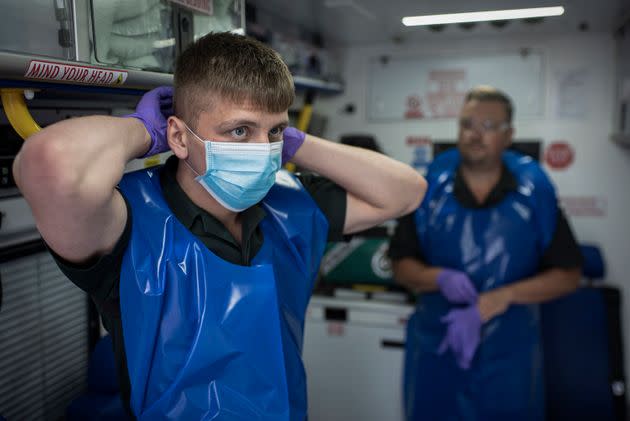This Is What It’s Like To Be A Paramedic On The Coronavirus Frontline

When I was offered the opportunity to go out and work as an ambulance clinical assistant during the coronavirus pandemic, I didn’t need to think twice. As a second-year paramedic science student it hit home that, with the number of ambulance crews growing in the face of coronavirus, this was a valuable chance to see how big an impact Covid-19 is having on the NHS and society as a whole.
My excitement about the learning opportunity quickly turned to thoughts of how vulnerable we might be: visiting patients who may or may not be Covid-positive, and the possibility of taking the virus home to family members was an odd but not unrealistic proposition. Was I putting the ones I love at risk by doing a job that I love? Even though it was scary, I decided it was a great opportunity for me to learn.
The first thing I learned was that it’s business as usual for ambulance crews, responding to calls as usual, albeit with the provision of personal protection equipment. West Midlands Ambulance Service, who I work with, had invested so much in PPE and gone all out to support and protect staff. Before the virus, we’d wear gloves, but now we have aprons, boot covers, masks, gloves and goggles. For paramedics, those first few minutes can make the difference, so while it’s time consuming, we got a lot faster with more experience of putting the PPE on.
Here’s what my first shift looked like:
First call, 1920hrs: Patient with blunt head injury, we attended and, following assessment, suggested that he went to hospital – however the man refused, so he was left in his own environment after spending 1.5 hours with him.
It was nerve-wracking taking my first call, when you’re on scene for so long your patient comes first so you forget your nerves. After that initial first job, I felt ready for my second and was feeling more confident.
Second call, 2115 hrs: Patient unconscious with noisy breathing, within ten minutes of arrival the patient had arrested and was...


